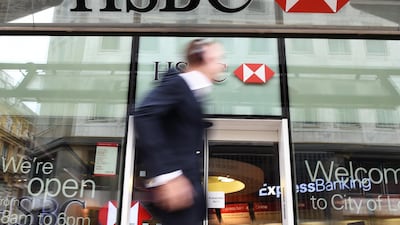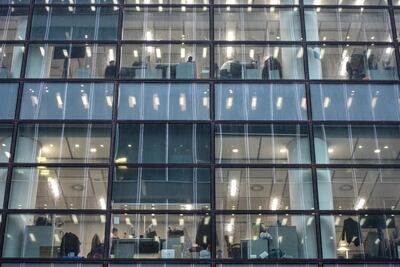HSBC will reduce its London office space by 40 per cent in the coming years as it looks to adopt a hybrid working model for staff in the latest signal of how the pandemic is changing workplace trends.
Europe’s largest bank said it will halve its “real estate footprint” globally over the long term, slashing 798,966 square metres of office space worldwide, equivalent to 112 football pitches, with its London reduction focused on ending leases on premises when they come up for renewal.
At certain times last year, up to 70 per cent of HSBC’s 226,059 global workforce were working remotely with the lender distributing more than 78,000 laptops and other items to employees to enable them to work remotely. The bank said it expects to see a “much greater degree of hybrid working” as the pandemic is brought under control.
HSBC chief executive Noel Quinn said the reduction would not include branches or the lender’s headquarters in London's Canary Wharf, with any buildings kept on to be used more flexibly.
"We are focused on those offices with support functions and head office activities when we talk about the 40 per cent reduction," Mr Quinn said, following the bank’s fourth-quarter results.
"We believe we'll achieve it via a very different style of working post-Covid, with a more hybrid model. Take London, for example, we will have the building at Canary Wharf – this will be the primary office but the nature of working in the office will change."
Meanwhile, Britain's biggest bank, Lloyds Banking Group, said it plans to cut 20 per cent of its office space by 2023 after 77 per cent of its staff said they wanted to work from home three or more days a week in the future.
Last year’s abrupt shift to remote working saw many industries adapt to a new style of office culture dominated by a heavy reliance on digital technology, such as video conference software Zoom and messaging platform Slack.
The British government said on Monday that homeworking should continue where possible as part of its gradual easing of England's third lockdown, meaning company offices will continue to remain largely empty until June 21 when the stay-at-home order is set to end.
Andrew Cooke, strategic director at workplace experts Bruntwood Works, said the office will look very different for businesses in future.
“Hybrid working, where customers split time between workspaces, homeworking and third spaces has steadily grown over several years, but the pandemic has acted as a nationwide social experiment that has supercharged this trend,” he said.
“The office and working from home are both key parts of every business’ toolkit and the balance between the two post pandemic will inevitably change. That means we need to see the office as an opportunity to provide spaces and environments that you just can’t replicate elsewhere.”
HSBC’s move to reduce its office space is a blow for the commercial property sector, where landlords are already under pressure, with office vacancies up 45 per cent on the year in the City of London to 641,031 square metres available, according to property consultancy DeVono Cresa.
HSBC, which employs 40,000 people in the UK, where it has 66 offices, said 85 per cent of its employees across the globe now work from home.
“We expect a change in the way we use our office space, recognising the work-life balance and environmental benefits of hybrid working arrangements,” HSBC said in its annual report. It said it had made impairments on “certain real estate assets” in 2020.
The move came as the bank unveiled a revised strategy focused mainly on wealth management in Asia after the pandemic saw its annual pre-tax profits drop 34 per cent to £6.2 billion ($8.77bn) for the 12 months to December from £13.3bn in 2019.
HSBC’s move to reduce office space falls in line with measures from other banks, such as Standard Chartered, which plans to offer flexible work options to more than 90 per cent of its 85,000 staff over three years.
However, others have cooled on the idea, with BlackRock’s Larry Fink and JPMorgan Chase & Co’s Jamie Dimon deciding against remote working, saying the trend could decrease productivity over time.
Last month, William Russell, lord mayor of the City of London, said major companies in the Square Mile are planning to let staff work three days in the office post-pandemic with the remainder of the week spent at home.
The financial district’s 500,000 workforce is currently working from home during England’s third national lockdown, leaving offices in the financial district virtually empty.



